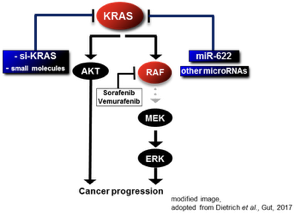AG Dietrich
AG Dietrich
Group Leader:
PD Dr. med. Dr. rer. physiol. habil. Peter Dietrich
Institut für Biochemie
Lehrstuhl für Biochemie und Molekulare Medizin (Prof. Dr. Bosserhoff)
- Telefon: +49 9131 85-29384
- E-Mail: peter.dietrich@fau.de
Research Focus
Hepatocellular carcinoma (HCC) is amongst the 5 most common cancer types worldwide. The majority of therapeutic situations are considered as palliative. Sorafenib is the only effective therapy for advanced Hepatocellular Carcinoma (HCC) patients, mainly affecting RAS/RAF/ERK-signaling.
Malignant melanoma (MM) reveals rapidly increasing incidence and mortality rates. By now, BRAF inhibition is the standard therapy for advanced melanoma in patients carrying BRAF mutations. Only ≈50% of melanoma patients harbor therapeutically attackable BRAF mutations, and overall survival after treatment with BRAF inhibitors is modest.
RAS/RAF/ERK-signaling is strongly involved in both HCC and MM development, progression, and resistance to current therapeutic approaches. Moreover, in recent years, a growing number of microRNAs (tumorsuppressive miRs or oncomiRs) were found to be dysregulated in HCC and melanoma thereby influencing critical pathways involved in the regulation of procancerogenic mechanisms like RAS/RAF/ERK and PI3K/AKT-signaling.
In our group, we study the molecular changes leading to acquired therapy resistance to Sorafenib treatment in HCC and to BRAF-Inhibitor treatment in MM, with a focus on dynamic alterations in major signaling pathways that are directly targeted by common therapeutic approaches, like the RAS/RAF/ERK and the PI3K/AKT-signaling cascades. We also address the involvement of microRNA-dysregulation on these and other carcinogenic alterations.


